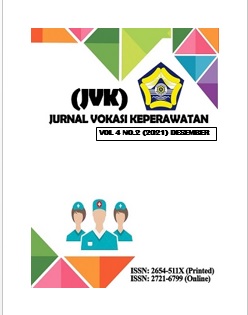Main Article Content
Abstract
Abstract
Competency testing is carried out as a form of maintaining the quality of graduates who have competencies in accordance with nationally established standards. The exit exam can simply be interpreted as a graduation exam, meaning that if a student is unable to meet the pass mark from the exam, he or she is declared not to have passed the nursing education. The purpose of this study was to see the relationship between institutional readiness and passing the exit exam of D3 nursing students. This study uses an analytical survey with a cross sectional study approach. Collecting data using a questionnaire in the form of google form. Sampling was done by simple random sampling with a total of 110 people. The results showed that there was no relationship between institutional readiness and graduation of D3 Nursing students in facing the exit exam with a fisher ecxact value = 0.589 > 005. It is hoped that there will be synergy between institutions, lecturers and students in preparation for the UKOM exit exam by discussing more standardized questions. ukom, attend tutoring and take part in internal and external try outs.
Keywords
Article Details
References
- Abdillah, A. (2016). Analisis faktor-faktor yang mempengaruhi kelulusan uji kompetensi ners Indonesia. Jurnal Penelitian Administrasi Publik, 2(2): 373–380.
- Benefiel, D. (2011). The story of nurse licensure. Nurse Educator, Lippincott Williams & Wilkins, 36(1), 16–20. https://doi.org/10.1097/ NNE.0b013e3182001e82
- Brodersen, L. D., & Mills, A. C. (2014). A Comparison of Two Nursing Program Exit Exams That Predict Outcome. CIN: Computers, Informatics, Nursing &, 32(8), 404–412. https://doi. org/10.1097/CIN.0000000000000081
- Hartina, A., Tahir, T., Nurdin, N., & Djafar, M. (2018). Faktor Yang Berhubungan Dengan Kelulusan Uji Kompetensi Ners Indonesia (Ukni) Di Regional Sulawesi. Jurnal Persatuan Perawat Nasional Indonesia (JPPNI), 2(2), 65. https://doi. org/10.32419/jppni.v2i2.84
- Hooper, J. I., & Ayars, V. D. (2017). How Texas Nurs- Jurnal Keperawatan Muhammadiyah Edisi Khusus 2019 68 ing Education Programs Increased NCLEX Pass Rates and Improved Programming. Journal of Nursing Regulation, 8(3), 53–58. https://doi. org/10.1016/S2155-8256(17)30160-6
- Kariasa, I. M., Tahir, T., Rahayu, U., Santoso, A., Slametiningsih, Soesanto, E.,Wahyuni, S. (2018). Sinersi Hadirkan Sukses Uji Kompetensi Ners Indonesia. Jakarta: Asosiasi Institusi Pendidikan Ners Indonesia (AIPNI).
- Kholifah, S., & Kusumawati, W. (2016). Hambatan Lulusan Ners Dalam Menghadapi Uji Kompetensi Ners Indonesia. The Indonesian Journal of Health Science,7(1),40–47.
- Notoatmojo, (2014). Metodologi Penelitian Kesehatan. Jakarta:Rineka Cipta.
- Panitia Ujian Kompetensi Nasional,( 2018). Buku Pedoman Uji Kompetensi Diploma 3 Keperawatan.
- Peraturan Menteri Pendidikan dan Kebudayaan RI No. 2 Tahun 2020 tentang Tata Cara Pelaksanaan Uji Kompetensi Mahasiswa Bidang Kesehatan
- Shoemaker, J. R., Chavez, R. A., Keane, P., & Butz, S. (2017). Effective Utilization of Computerized Curricular Assistive, 43081 (April), 194–200.
- Sugiarto. 2001. Teknik Sampling. Jakarta: PT. Gramedia Pustaka Utama.
- Sugiyono. 2011. Metode Penelitian Administratif. Bandung: Alfabeta
- Suyono, & Hariyanto. (2015). Implementasi Belajar & Pembelajaran. Bandung: Remaja Rosdakarya.
- Undang-Undang Republik Indonesia Nomor 38 Tahun 2014 Tentang Keperawatan (2014). Jakarta. Retrieved from www.kemenkopmk.go.id/content/uu-nomor-38-tahun-2014
References
Abdillah, A. (2016). Analisis faktor-faktor yang mempengaruhi kelulusan uji kompetensi ners Indonesia. Jurnal Penelitian Administrasi Publik, 2(2): 373–380.
Benefiel, D. (2011). The story of nurse licensure. Nurse Educator, Lippincott Williams & Wilkins, 36(1), 16–20. https://doi.org/10.1097/ NNE.0b013e3182001e82
Brodersen, L. D., & Mills, A. C. (2014). A Comparison of Two Nursing Program Exit Exams That Predict Outcome. CIN: Computers, Informatics, Nursing &, 32(8), 404–412. https://doi. org/10.1097/CIN.0000000000000081
Hartina, A., Tahir, T., Nurdin, N., & Djafar, M. (2018). Faktor Yang Berhubungan Dengan Kelulusan Uji Kompetensi Ners Indonesia (Ukni) Di Regional Sulawesi. Jurnal Persatuan Perawat Nasional Indonesia (JPPNI), 2(2), 65. https://doi. org/10.32419/jppni.v2i2.84
Hooper, J. I., & Ayars, V. D. (2017). How Texas Nurs- Jurnal Keperawatan Muhammadiyah Edisi Khusus 2019 68 ing Education Programs Increased NCLEX Pass Rates and Improved Programming. Journal of Nursing Regulation, 8(3), 53–58. https://doi. org/10.1016/S2155-8256(17)30160-6
Kariasa, I. M., Tahir, T., Rahayu, U., Santoso, A., Slametiningsih, Soesanto, E.,Wahyuni, S. (2018). Sinersi Hadirkan Sukses Uji Kompetensi Ners Indonesia. Jakarta: Asosiasi Institusi Pendidikan Ners Indonesia (AIPNI).
Kholifah, S., & Kusumawati, W. (2016). Hambatan Lulusan Ners Dalam Menghadapi Uji Kompetensi Ners Indonesia. The Indonesian Journal of Health Science,7(1),40–47.
Notoatmojo, (2014). Metodologi Penelitian Kesehatan. Jakarta:Rineka Cipta.
Panitia Ujian Kompetensi Nasional,( 2018). Buku Pedoman Uji Kompetensi Diploma 3 Keperawatan.
Peraturan Menteri Pendidikan dan Kebudayaan RI No. 2 Tahun 2020 tentang Tata Cara Pelaksanaan Uji Kompetensi Mahasiswa Bidang Kesehatan
Shoemaker, J. R., Chavez, R. A., Keane, P., & Butz, S. (2017). Effective Utilization of Computerized Curricular Assistive, 43081 (April), 194–200.
Sugiarto. 2001. Teknik Sampling. Jakarta: PT. Gramedia Pustaka Utama.
Sugiyono. 2011. Metode Penelitian Administratif. Bandung: Alfabeta
Suyono, & Hariyanto. (2015). Implementasi Belajar & Pembelajaran. Bandung: Remaja Rosdakarya.
Undang-Undang Republik Indonesia Nomor 38 Tahun 2014 Tentang Keperawatan (2014). Jakarta. Retrieved from www.kemenkopmk.go.id/content/uu-nomor-38-tahun-2014
